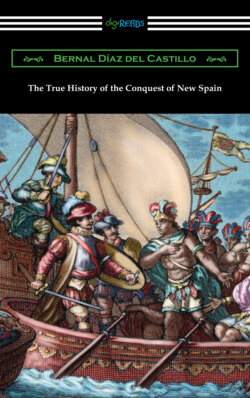Читать книгу The True History of the Conquest of New Spain - Bernal Diaz del Castillo - Страница 70
На сайте Литреса книга снята с продажи.
CHAPTER LXIV.
ОглавлениеHow we quartered ourselves in the township of Tehuacacinco, and what we did there.
As the battles we fought had greatly fatigued us, besides that several of our men and horses were wounded, we made a day of rest, repaired our crossbows, and supplied ourselves with arrows. The next morning Cortes said to us, “It would be no harm if our horse were to gallop up and down the country a little; the Tlascallans might otherwise think we had had enough of it in the last battle: we must show them that we are constantly at their heels.” And indeed it was better that we began ourselves than wait until we should be attacked, that the enemy might not suppose we had been too greatly weakened, and had lost our courage. Besides this, the country round about was quite level, and thickly populated. We therefore ordered out seven horse, some crossbow-men, and several musketeers, in all 200 men, without including our confederates. Every possible precaution had been previously made to secure our camp. On our march through the townships we captured twenty Indians of both sexes, but in no way molested them. Our allies, however, who were barbarous characters, could not refrain from setting fire to many houses where they had found quantities of fowls and young dogs. After we had again returned to our quarters, Cortes ordered the fetters to be taken off the prisoners, and food to be given them. Doña Marina and Aguilar then addressed them very affectionately, and gave to each some glass beads, adding, at the same time, that in future they should not be so foolish, but make peace with us, as we were very desirous of looking upon them as brothers, and would protect them as such.
We also set the first two Indians at liberty whom we had captured, and gave them a letter with the commission to tell the chief of the provinces that we were not come in any way to injure the Tlascallans, but merely wished to take the road through their country to Mexico, there to have an interview with Motecusuma.
Both these delegates punctually followed our orders, and arrived at the head-quarters of Xicotencatl, which lay, if I remember rightly, about six miles from our camp, in the township of Tehuacinpacingo. Having, in the absence of the father, fulfilled our commission to the younger Xicotencatl, he told them, we had only to come to his father’s township, there they would make peace, after they had satiated themselves with the flesh of our bodies, and had honoured their gods with the sacrifice of our blood and hearts. The next morning we should behold his answer with our own eyes.
As the last battles were still fresh in our memories, we did not exactly relish the haughty answer with which our delegates returned. Cortes, nevertheless, received them most kindly, perceiving, from their return, that they no longer stood in awe of us; and with the view that they should once more be despatched as messengers of peace, he gave them some additional strings of beads. For the rest he made the most minute inquiries respecting the commander Xicotencatl, and the number of his troops, and found that the latter were much more numerous than in the last battle: he had now five chiefs under him, each of whom commanded 10,000 men. These troops were enumerated in the following manner: First of all came the 10,000 men of Xicotencatl’s division; next a similar number under another powerful cazique called Maxixcatzin; then a like number under the distinguished cazique Chichimeclatecl; 10,000 under the cazique of Topoyanco, named Tecapaneca; and an equal number under the cazique Quaxobcin;—altogether thus 50,000 men. Each troop had its standard and arms, the latter being a large white bird, with outspread wings, as if preparing to fly, and resembled an ostrich.{26} Besides this, every chief had his particular insignia of war and colours, in the same way as our Spanish dukes and earls. At first we did not believe anything of all this, but found afterwards that it was perfectly true; and since we were human beings, and feared death, we all confessed to father Olmedo and the priest Juan Diaz, which occupied them the whole of the night: neither did we fail to offer up fervent prayers to the Almighty to grant us victory. Under such like occupations the following day broke forth on which we were to fight the battle, of which I shall speak in the next chapter.
